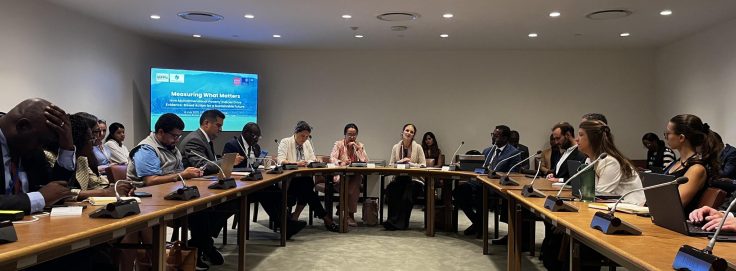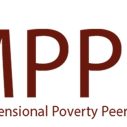
Search
‘We can’t end poverty if we can’t measure it accurately’: HLPF Side Event explores how MPIs accelerate SDG progress

The Permanent Mission of Uruguay to the United Nations, UNDP’s Regional Bureau of Latin America and the Caribbean (RBLAC), and the Multidimensional Poverty Peer Network (MPPN) were delighted to co-host a well-attended Side Event at the 2025 High-Level Political Forum in the UN Headquarters on 14 July. This event, titled “Measuring What Matters: How Multidimensional Poverty Indices Drive Evidence-Based Action for a Sustainable Future”, brought together high-level representatives from international agencies, governments, and OPHI’s MPI Ambassadors and Champions to discuss how Multidimensional Poverty Indices (MPIs) can accelerate the achievement of the SDGs and shape the agenda beyond 2030.
Gabriela González, Deputy Permanent Representative of Uruguay to the UN, opened the event with welcoming remarks. She explained that although Uruguay is a high-income country, significant gaps and inequalities persist. She also reported that the adoption of a multidimensional approach to measuring poverty has proven very helpful for her country. She shared that Uruguay is the latest country to launch its national MPI and explained that it was developed in close collaboration with civil society and with various United Nations institutions. Uruguay hopes that it can serve as a good example that other countries can learn from, demonstrating how small countries can organise effective policies with UN system support.
The event centered around three key priorities. The first panel highlighted the importance of global, regional and national commitments for poverty alleviation and wellbeing using multidimensional measurement. Claver Gatete, Executive Secretary, United Nations Economic Commission for Africa (UNECA) gave an overview of Africa and said, ‘it is impossible to end poverty if we cannot measure it accurately’. Gatete urged wider adoption of MPIs. He also commented on the importance of disaggregated data in guiding policymaking. Gatete explained that UNECA were trying to find a new way of helping countries to understand the situation that poor people live in. He remarked that the MPI helps paint a more qualitative picture, revealing not only how many people are poor but how they are poor across multiple dimensions simultaneously. He also shared that as of 2025, 43 countries have reported MPIs against the SDG, with Uruguay among them.
Gatete reported that a recent UNECA review of MPI trends showed that African progress has been notable, with eSwatini showing the fastest absolute reduction globally, Sierra Leone second. If an absolute rather than relative measure of poverty trends is used, eleven out of the fastest 20 global reducers of MPI are in Africa. African governments are using MPI data to drive policies, with Ghana allocating resources to the poorest districts, Mozambique developing post-COVID policies, and Sierra Leone tailoring solutions to districts. UNECA, he said, stands ready support countries in their development and implementation of MPIs, and to leverage it for social protection.
He concluded by saying, ‘We can only change what we can see and measure. As we are coming close to end of 2030 Agenda, we must shift from measuring what is convenient to measuring what matters most. That is why we put a lot of attention onto measuring poverty properly.’
Khalid Abu-Ismail, Senior Economics Affairs Officer, Poverty and Development Challenges, UN Economic and Social Commission for Western Asia (UNESCWA) shared how UNESCWA supports its member countries to address multidimensional poverty through the creation of MPI reports and analyses, a regional priority since 2019. UNESCWA has also developed the MPI Assist Tool (MAT), which enables state officials to model the impact of shocks on MPI and to create MPI targets and benchmarks.
The second panel discussed multidimensional poverty and the Second World Summit for Social Development (WSSD2) which will take place in November 2025. Sabina Alkire, the Director of OPHI pointed out that some MPIs already include the WSSD’s key themes of poverty eradication, work, and social integration. Thirty-four countries’ national MPIs include work, and all national MPIs include some areas of social integration and are disaggregated. She had four suggestions going into WSSD2:
Create a centre of gravity by which to assess poverty reduction, keeping the number of indicators small and resisting the temptation to keep adding indicators.
- The centre of gravity could include national MPIs and the Global MPI, as well as national and global monetary poverty indices.
- Set targets with respect to absolute and relative rates of poverty reduction, and the number of poor leaving poverty – because these are possible, even for the poorest places.
- Communicate the MPI proactively, so that old-timers as well as newcomers to poverty reduction have the data they need to make a real impact, cost effectively.
Almudena Fernández, Chief Economist, UNDP Regional Bureau for Latin America and the Caribbean highlighted the region’s rich history in measuring and addressing poverty beyond income since the 1970s. She reminded us that LAC was one of the first regions to adopt MPI, with Mexico being the first country to develop and institutionalise a multidimensional poverty measure as official statistic, Colombia remaining one of the most engaged and advanced in policy uses of MPIs, Panama pioneering a focus on children’s deprivations, and El Salvador championing a unique participatory and innovative approach in the construction of its MPI. She shared that fourteen countries in the region now have an MPI, with Uruguay being the most recent.
Fernández expressed UNDP’s pride in its collaboration with OPHI on the Global MPI, which allows for multidimensional poverty comparisons across 112. In addition, she reported the recent development of a regional MPI for Latin America, led by the UNDP regional bureau. Complementing, rather than replacing global or national indices, the key findings of this new regional MPI showed that LAC has made fantastic progress, almost halving MPI. But trends over time also showed that momentum had slowed, with progress now being slower. She concluded with a call for action: ‘MPI measurement and analysis will play a crucial role as we move to 2030 Agenda end and beyond. Let’s use MPIs them to accelerate achievement.’
Ana Helena Chacón, former Vice President of Costa Rica and MPI Inaugural Ambassador spoke on how poverty alleviation will be at the centre of leaders’ discussions during WSSD2. She observed that many study leaders – but if poverty reduction is our greatest global toal we need to invest intentionally in cultivating leadership of a particular kind: leadership in reducing poverty. Vice President Chacón also stressed the importance of collaboration platforms such as the Global Alliance against Hunger and Povertyin actioning strategies to leave no one behind, especially those living in poverty.
The final panel described the key role of MPIs and multidimensional poverty in the current juncture. Marcelo Bisogno, Technical Director of the National Institute of Statistics, Uruguay, shared findings from Uruguay’s newly released national MPI, which allows the country to focus not just on who is poor, but how they are poor, enabling more targeted and effective interventions. He shared that climate change, demographic shifts, and new forms of inequality have tested the resilience of their systems, making dialogue around tackling multidimensional poverty more vital than ever.
Mr Bereket Fesehatsion, Minister of State at the Ministry of Planning and Development, Ethiopia shared that Ethiopia is adopting the MPI from a point of clear leadership commitment to development for those who need it most, shaping their pro-poor growth agenda for 20 years. They have one of Africa’s largest social protection programs and have now adopted MPI alongside HDI and prosperity index into their National Development Plans. After 30 years of commitment to poverty measurement and five rounds of large-scale household survey data collection, Ethiopia is now taking a significant step forward with the establishment of their own MPI, co-developed through extensive consultations with academics, governments, ministries, NGOs, CSOs, and regional stakeholders. The new MPI, to be launched in 2026 based on new survey data, will be used to guide budgeting, targeting, and foster collaboration across ministries. He closed with saying that the aim was to all of us to ‘turn metrics into meaningful outcomes for the people who we serve’.
Gonzalo Hernández Licona, former Executive Secretary of CONEVAL and MPI Inaugural Champion, discussed the importance of not addressing poverty reduction in silos, especially when new shocks and international turmoil are currently challenging development. He shared how the MPI is a key tool for integrated policymaking, since the transparency of its data allows analysis of simultaneous deprivations in people’s lives, creating actionable insights which are pivotal for impactful poverty interventions.
Sola Afolayan, former MPI Coordinator in Nigeria and MPI Champion, presented extensive highlights from the 2025 Voluntary National Reviews (VNRs). Nineteen countries reported multidimensional poverty data or aspirations in their VNRs. She cited success stories and policy innovations in Eswatini, Nigeria, India, Ghana, El Salvador, Papua New Guinea and Malaysia. Speaking out of her own experience, Ms Afolayan emphasised that MPIs highlight country ownership in reporting to and addressing SDG Indicator 1.2.2, the only indicator for which national governments are the custodian agencies – and advised that MPI be communicated widely across user groups.
In her closing remarks Isabel Saint Malo, former Vice President of Panama and MPI Ambassador, reflected on key themes of this dynamic discussion. She spoke of the need for innovative, accelerated efforts to achieve the Sustainable Development Goals (SDGs) as we approach 2030. Vice President Saint Malo herself commended MPIs as a powerful tool, and observed that others too have underlined its value added in profiling interlined deprivations and improving poverty budgeting.
HLPF is taking place between 14 and 23 July on the theme ‘Advancing sustainable, inclusive, science- and evidence-based solutions for the 2030 Agenda for Sustainable Development and its Sustainable Development Goals for leaving no one behind.’ SDG 3 (good health and well-being), SDG 5 (gender equality), SDG 8 (decent work and economic growth), SDG 14 (life below water), and SDG 17 (partnerships for the Goals) will be reviewed. This is the first HLPF focusing on implementation of the Pact for the Future and the Political Declaration which were adopted at the SDG Summit in 2023.
Participants at HLPF are warmly invited to reach out to OPHI’s Director Sabina Alkire. Sabina will be speaking at several HLPF events including:
17 July
- The India-Brazil-South Africa (IBSA) Fund – A Partnership for Sustainable Development.UNOSSC, Conference Room 8, 13:15-14:30
21 July
- Accelerating Social Progress to Boost SDG Implementation: UN DESA Global Policy DialogueRegister to join online: bit.ly/online21julyUN DESA, Conference Room 11, 11:00-12:30
23 July
- Towards an Inclusive Future: Shaping Africa’s Voice in the Second World Social SummitUNECA, Conference Room 2, 13:15-14:30
- Leveraging Data and Technology to Accelerate SDGs Implementation, Monitoring and Follow-up Thailand, Conference Room 3, 13:15-14:30
















